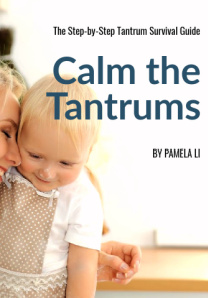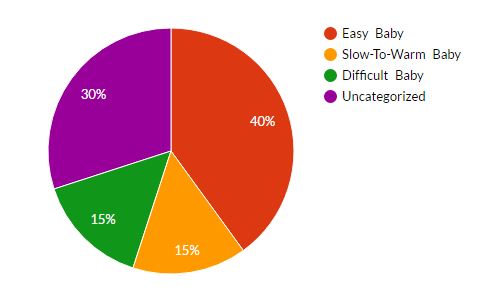Difficult Babies With an Intense and a Highly Reactive Temperment Tend to Be
All parents wish they had easy babies. Parents who have difficult babies often envy those who have calm ones. But research shows that having a child with a difficult temperament is actually not a bad thing. In this article, we will explain what temperament is, look at the three types of temperament and show you what to do if you have a difficult baby.
As parents of multiple children already know, each child is different when they are born even though they are raised in the same home. Right from the beginning, newborns already show distinct styles of responding to the environment. Each of them has their individual child's temperament and baby personality types.
What Is Temperament
Temperament is a child's early-appearing variation in emotional responses and reaction to the environment.
Child temperament is a result of biological and environmental factors working together throughout a child's development since conception rather than based entirely on genetics 1,2 .
There are different categorizations of temperament by different researchers. The most influential research is conducted by doctors and psychologists, Chess and Thomas 3 .
Their well-known New York Longitudinal Study lasted for several decades (1956-1988) and found 9 temperamental traits that can be commonly identified in young children.

9 Temperament Traits (Thomas and Chess)
1. Activity
The level and extent of motor activity.
2. Regularity
The rhythmicity, or degree of regularity, of functions such as eating, elimination and the cycle of sleeping and wakefulness.
3. Initial Reaction
The baby's response to a new things or new people, in terms of whether the child approaches the new experiences or withdraws from it.
4. Adaptability
The adaptability of behavior to changes in the environment.
5. Sensitivity
The sensory threshold, or sensitivity, to stimuli.
6. Intensity
The energy level or the intensity of reactions.
7. Mood
The child's general mood or "disposition", whether cheerful or given to crying, pleasant or cranky, friendly or unfriendly.
8. Distractibility
The degree of the child's distractibility from what he is doing.
9. Attention span and persistence
The span of the child's attention and his persistence in an activity.
For more help on calming tantrums, check out this step-by-step guide

Types Of Temperament
Among the nine types of temperament trait categories, researchers found that six of them, activity, regularity, initial reaction, adaptability, intensity, and mood, tend to cluster together to form three types of temperament.
The three types of children temperament styles are:
- easy temperament
- difficult temperament
- slow to warm up temperament
Easy Temperament

Easy temperament is characterized by regular bodily functions, positive approach to new situations, adaptability, positive mood and non-intense reaction to stimuli.
Raising these children is relatively easy because they respond favorably to various child-raising practices. They readily adapt to different parental handling.
Difficult Temperament

Difficult temperamentis characterized by irregular bodily functions, withdrawal from new situations, slow adaptability, negative mood, and intense reaction. Raising these children is difficult from the get-go.
But this is by no means the definition of being "difficult".
Parentsknow when they have difficult babies.
Difficult babies with an intense and highly reactive temperament tend to be crying a lot. They cry hard, they cry loudly and they are hard to soothe. They are also cranky babies. They tend to have sleep problems. They have a hard time falling and staying asleep. When they wake up in the middle of the night, they have trouble going back to sleep.
These difficult babies are also called a colic, spirited, stubborn or high need baby.
Colic in babies is particularly frustrating for overwhelmed and exhausted parents.

Slow To Warm Up Temperament

The slow to warm up child is characterized by low activity level and low intensity of reaction although they also have a tendency to withdraw from new situations, slow adaptability and somewhat negative in the mood.
A slow-to-warm-up child is a cautious child. These kids can adapt to new situations if they're allowed to do that at their own pace. However, if pressured to do so, these children may fall back to their natural tendency to withdraw.
| Temperament Traits | Easy | Slow-to-warm | Difficult |
|---|---|---|---|
| Regularity | Regular | N/A | Irregular |
| Initial reaction | Approach | Withdraw | Withdraw |
| Adaptability | Fast | Slow | Slow |
| Intensity | Non-intense | Low | Intense |
| Mood | Positive | Slight negative | Negative |
| Activity | N/A | Low | N/A |

Roughly 40% of babies have the easy temperament, 10% difficult and 15% slow to warm temperament. 30% of children do not fall into any of the three identified types.
Difficult Temperament And Tough Love Parenting
The relationship and influence between a baby's temperament and parenting are bidirectional 9 . Difficult children's temperaments tend to elicit a tough response and inconsistent discipline from parents 10 .
When a baby cries incessantly, you may have the urge to shout at them to stop. And when your difficult child yells at you, it is natural that you want to yell back.
Tough love parenting is therefore sometimes used by parents whose children have a difficult temperament.
However, according to research, low emotional support, e.g. tough-love parenting, tends to raise children who have worse outcomes. Studies find that there is less mental well-being among people raised by authoritarian parents 11 .
But you can often hear people who boast being raised by tough parents and turning out fine.
Why is there a discrepancy?
This difference in resilience can be explained by the Diathesis Stress Model.
According to the Diathesis-Stress Model, people who have a predisposition or vulnerabilities to suffer from a psychological disorder require a lower threshold to trigger the disorder.
When a difficult child's disposition is more vulnerable, if they are parented by tough parents, they are more likely to develop psychological disorders later.
So tough love is simply not the answer to raising children with a difficult temperament. It can make things worse.
By remaining calm, responsive and sensitive, it may take a long time to get through to your child and the process may be painstaking. But at the end of the day, the reward of being a good parent will be tremendous.
Is Easy Baby Better Than Difficult Baby?
There is no such thing as a good temperament or bad temperament.
Many parents of babies with irregularities wonder, "Is my baby difficult?"
If you have an easy baby, congratulations! You probably have more sleep than many other parents. We envy you!
But if you have a difficult one, you have more work cut out for you.
Caring for a difficult baby is exhausting and worrisome. The most worrisome aspect is perhaps the fact that difficult baby temperament is associated with more behavior problems and emotional disorders later in life 4,5 .
However, do not despair if you have a difficult baby.There is actually good news for you.
Differential Susceptibility
Studies have shown that differential susceptibility plays a big role in a child's outcome 6 . That means temperament by itself does not determine how a child will turn out because of its cross-over interaction with the environment 7 .
What Is Differential Susceptibility?
Differential susceptibility means young children with a difficult temperament are disproportionately affected by parenting. They react more (more susceptible or more sensitive) to the quality of parenting than easy children, for better and for worse.
When raised with good parenting, a kid with difficult child temperament tends to do better in cognitive, academic and social adjustment than their easy counterparts. On the other hand, when parenting is bad, a difficult baby will fare worse when they grow up.
So you should be thrilled if you have a difficult or sensitive baby. Sensitive babies actually have a better chance to succeed, if you do your part in providing good parenting.
Child Temperament Types And Parenting Style

In studies on differential susceptibility, parenting quality is defined as good when parents show a high level of emotional and autonomy support. Bad parenting is when the parents show a low level of emotional and autonomy support 8 .
This definition is similar to one of the criteria used to categorize the four Baumrind's parenting styles. Among the four styles, authoritative parenting, which provides high emotional and autonomy support, is the best according to numerous studies. It comes as no surprise that such parenting style also provides the most positive impact on difficult children.
And because of this differential susceptibility property, it is even more important for parents of difficult babies to adopt an authoritative parenting style.
References
-
1.
Shiner RL, Buss KA, McClowry SG, Putnam SP, Saudino KJ, Zentner M. What Is Temperament Now? Assessing Progress in Temperament Research on the Twenty-Fifth Anniversary of Goldsmith et al. (). Child Dev Perspect. July 2012:n/a-n/a. doi:10.1111/j.1750-8606.2012.00254.x
-
5.
De Schipper JC, Tavecchio LWC, Van IJzendoorn MH, Van Zeijl J. Goodness-of-fit in center day care: relations of temperament, stability, and quality of care with the child's adjustment. Early Childhood Research Quarterly. April 2004:257-272. doi:10.1016/j.ecresq.2004.04.004
-
6.
Pluess M, Belsky J. Children's differential susceptibility to effects of parenting. Family Science. February 2010:14-25. doi:10.1080/19424620903388554
-
7.
Pluess M, Belsky J. Differential susceptibility to parenting and quality child care. Developmental Psychology. 2010:379-390. doi:10.1037/a0015203
-
8.
Stright AD, Gallagher KC, Kelley K. Infant Temperament Moderates Relations Between Maternal Parenting in Early Childhood and Children's Adjustment in First Grade. Child Development. January 2008:186-200. doi:10.1111/j.1467-8624.2007.01119.x
-
9.
Kiff CJ, Lengua LJ, Zalewski M. Nature and Nurturing: Parenting in the Context of Child Temperament. Clin Child Fam Psychol Rev. April 2011:251-301. doi:10.1007/s10567-011-0093-4
-
10.
Lengua LJ, Kovacs EA. Bidirectional associations between temperament and parenting and the prediction of adjustment problems in middle childhood. Journal of Applied Developmental Psychology. January 2005:21-38. doi:10.1016/j.appdev.2004.10.001
-
11.
Betts J, Gullone E, Allen JS. An examination of emotion regulation, temperament, and parenting style as potential predictors of adolescent depression risk status: A correlational study. British Journal of Developmental Psychology. June 2009:473-485. doi:10.1348/026151008×314900
Disclaimer
* All information on parentingforbrain.com is for educational purposes only. Parenting For Brain does not provide medical advice. If you suspect medical problems or need professional advice, please consult a physician. *
Difficult Babies With an Intense and a Highly Reactive Temperment Tend to Be
Source: https://www.parentingforbrain.com/easy-baby-what-is-temperament/#:~:text=Parents%20know%20when%20they%20have,they%20are%20hard%20to%20soothe.
0 Response to "Difficult Babies With an Intense and a Highly Reactive Temperment Tend to Be"
Post a Comment